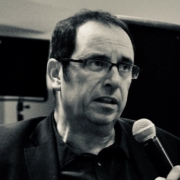Today we talk about collaboration, both its good and bad sides. My guest is Amy Shuffelton, a professor of philosophy at Loyola University Chicago.
Amy Shuffelton’s new book is Collaboration: Philosophy of Education in Practice, which was published by Bloomsbury in February.
Citation: Shuffelton, Amy with Will Brehm, FreshEd, 346, podcast audio, March 18, 2024.https://freshedpodcast.com/shuffelton/
Will Brehm 0:14
Amy Shuffelton, welcome to FreshEd.
Amy Shuffelton 0:54
Hey there, Will. It’s a pleasure to be here.
Will Brehm 0:56
So, congratulations on your new book. It really was enjoyable to read, I must say. In it, you talk about some experiences you had running this program called The Game of Village, which I actually never had heard of before reading your book. You started running this program -it was sort of like a day camp of some sort- in New Hampshire. Can you describe what this program was? And what was interesting to you about it?
Amy Shuffelton 1:17
Sure. Well, it really is a very small program. It started off as a day camp in New Hampshire. It was the brainchild of a woman who had a house in New Hampshire named Cia Iselin who loved miniature things. She loved making miniatures and playing outside with them with her brother when she was a kid. And she loved Madurodam, which is a town in the Netherlands -it’s a miniature city. She was an idealist and she had the great idea sometime in the early 1970s, of inviting the kids from the town she lived in -this is rural New Hampshire- to come over to her house and to take an acre of land and build a village on it in miniature. So, in 1:24 scale. By the time I got there, it was the 1980s. I was a kid, my best friend was going to camp and so I went and loved it. It works kind of like this; you get there and every kid starts by making a “peep”, which is a small person in 1:24 scale. So, we’re talking two and a half, three inches. They’re made out of wire wrapped in yarn, they have a head made out of clay that you can bake in the oven, right? So, Fimo or Sculpey are the names. And your peep is not you. This is important, right? Like I have a peep. His name is Zbysvek, he’s Polish, he did healthcare for a long time, he’s lately decided he wants to turn to poetry to writing, he’s feeling a little frustrated with the neoliberal turn that healthcare has taken. But the idea in this miniature world, you and your peep are partners, and you’re working together with everybody else in the town, which is a group of kids, it can be as few as 10 up to about 24 bigger than that it gets harder for everybody to know each other. And you’re building a miniature town together. So, you start with your peep, your peep needs a piece of property, a piece of land to build on. You can do this inside in the classroom and do it on sheets of plywood that get folded up at the end of the day, or it could be outside on a piece of land. One bit is yours and your peeps and the rest of the land is well, it’s other people’s or it’s public land, and you build a place for your peep to live and then collectively, the group builds the town. And at the beginning, there’s a very small handful of laws that we call the federal laws, the national laws of the United States of Peeps, or the Federal Republic of Peeps, depending where. And those are things like everybody has to clean up at the end of the day, you have to respect other people and peeps, but they’re pretty small, pretty limited in number right? So, all the specific laws about trespassing, about stealing things, about copyrighting things, I mean, everything like those have to be created by kids, which they pretty much do as the need arises. And this is where it gets really interesting to me. It’s kids about middle school age, so about nine to 14 years old. So, it’s kids just starting to think abstractly and starting to grapple with why the world’s institutions are set up the way they are.
Will Brehm 3:51
Yeah. Okay. And there’s no direction from adults?
Amy Shuffelton 3:55
Just keeping the thing on the rails.
Will Brehm 3:56
Right okay. And maybe health and safety issues as well. And so what was it like trying to grapple with your fellow classmates between 9-14. Trying to figure out what other laws might need to exist and how to make collective decisions.
Amy Shuffelton 4:14
Okay, when I was a kid, I started doing this when I was 13, and then 14. So, I was already kind of on the older end. But there was a camp counselor all through high school and college. And then after I graduated from college, this is the early 1990s, my then boyfriend now partner, and I went to Poland, and did this with Poland. And that’s where it got really interesting for me.
Will Brehm 4:36
How so?
Amy Shuffelton 4:37
First of all, we did this as a summer camp in New Hampshire. And if you worked with kids in New Hampshire, pretty much always they would say, well, if we’re going to have a town, we need to have a government and if we’re going to have a government, it needs to be fair. And if it’s going to be fair, that means everybody has to participate. And if everybody has to participate, it means we want to all sit together and make discussions together. So, they pretty much always reinvented the New England town meeting. And it was just patently obvious to everybody that this is what we should do. And they did pretty well. I mean, you know, they got into arguments and disputes. And sometimes people quit the town meeting, they didn’t quit the game, they just stormed out and said, “This is stupid”. But mostly everybody did it. When we went to Poland, the kids pretty much said, “We don’t want a government. Government is stupid. Who wants a government”? It was patently obvious to them that nobody would ever want a government.
Will Brehm 5:22
And what era was this in Poland?
Amy Shuffelton 5:24
Early 90s.
Will Brehm 5:25
I mean, to what extent is the context sort of shaping what these kids think is right and wrong?
Amy Shuffelton 5:30
I mean, they had no experience of government actually working for ordinary people. Government was just the heavy hand of people with more power than you. So, the challenge for us then became in a sense, like, how do you convince people to reinvent democracy from the ground up? Which eventually, I mean, we got kids to get engaged as particular problems came up -and the kids- that somebody broke something that belonged to somebody else, or somebody stole somebody’s idea, or somebody made fake money, and the kids would come to us and want us to solve it. And we would say, we’re not solving this, you have to solve it. And kids would say, but you’re the grownups and we’d say, but it’s your village. Eventually, we got them making some decisions. I’m not sure they ever considered that to be a government. But it got us thinking about what it is the government is and what it is the government does.
Will Brehm 6:17
And when they got together to make those collective decisions in Poland did it look similar to that New England sort of town hall meeting?
Amy Shuffelton 6:27
It did, although with a twist. If New England kids were very quick to say we should have a government and come up with these sort of structural institutional ways of solving collective problems, Polish kids were -at least in the early 1990s- much quicker to just solve things in a personal way. If you know that we don’t want a government makes them sound like hermits or like some kind of libertarian recluses, they really were not. And so they managed to avoid a lot of problems by just sort of solving, right? Like if a kid came back after missing school for a week because they’d been sick, somebody would say, “Hey, Anna is way behind on her house. Hey, P., why don’t you help her because you’re really good at building?” And P. would put down what he was doing and go help Anna. And these things happened all the time. So, there was this strong, collective mutual support, mutual help.
Will Brehm 7:14
In the book you use mutual aid, I think is the word that you used.
Amy Shuffelton 7:17
Yeah. They just didn’t see any reason to institutionalize it as a government.
Will Brehm 7:21
So, democracy then can take many different forms as children participate and deliberate and collaborate.
Amy Shuffelton 7:30
Yes. Okay. So, in a sense, the Polish kids were collaborating, and the American kids were collaborating. The Polish kids would never have called what they were doing collaborating, because as you know, if you spent any time in Eastern Europe, collaborate is not a nice word. Like there’s a cognate of the word collaborate in a ton of European languages, and there’s often some version of it, that means basically, sell your people out to the Nazis or to the Communist Party, or to whatever oppressive authority structure is in place. So, to collaborate can very much mean to throw your peers under the bus for your own sake. So, that would not have been what they called it.
Will Brehm 8:06
But in New Hampshire, they would call it collaboration?
Amy Shuffelton 8:09
I’m not sure if they did in New Hampshire, but I first started noticing Americans use of the word collaborate, when, after Poland, I came back to the United States, and I went to get my PhD in education. And I kept hearing people -and this is at the University of Wisconsin, so late 1990s- I kept hearing people talk about teaching kids to be good collaborators. And every time I heard that phrase, good collaborator, I would sort of flinch because the person who had spent time in Poland inside me just thought, that’s not what we want to teach them.
Will Brehm 8:37
What did the professors mean in Wisconsin about why children should collaborate? And why it was seen as so positively?
Amy Shuffelton 8:44
Because we do need to learn how to work together, right? What struck me I guess, is that the word collaborate in English has, in a sense, nothing except positive nuances, right? It simply means that we work together, which, if you think about it, I mean, neither from the perspective of the dominant mainstream culture of the white Anglo people in the United States, and Australia, and the UK, those are places that have never been occupied, right? They’ve done the occupying, but they’ve never been occupied. So, collaborate could be just a good thing, right? Like we want people to collaborate with those of us who speak English. Whereas in countries like France, Poland, it has a different nuance. It may well have a very different nuance among like the Navajo, Puerto Ricans, the Maori, it would be interesting to find out.
Will Brehm 9:29
Yeah, exactly, if it does sort of have that political element -the negative connotation that you first heard in Poland. So, is collaboration, still popular in education circles today?
Amy Shuffelton 9:41
We hear it all the time. I mean, I hear it all the time as a buzzword. You know, “She’s a good collaborator”, “we need to teach kids to collaborate”, “kids need to learn how to collaborate”.
Will Brehm 9:48
And what’s interesting in your book is you look at what this means, sort of philosophically and you sort of say that collaboration can sort of bring out the best actions as well as the worst actions of human behavior. What does that mean to you?
Amy Shuffelton 10:03
I really think that’s true. I mean, the greatest things that human beings have managed to accomplish, we have often accomplished together. In some sense, we have always accomplished together. You know, human beings to create anything needs some kind of a culture, they need institutions, they need some kind of supportive fellow humans, and that’s collaboration, or it takes collaboration. So, it is absolutely true that we need to teach kids to be good collaborators. But it also matters what the power dynamics are within those collaborations and towards what ends are we collaborating? And with whom are we collaborating? And with whom are we not collaborating? Because, of course, that’s the other story is that often collaborating means us sticking together against them?
Will Brehm 10:40
Yeah. And so those sort of power dynamics within collaboration you bring to life in this discussion of group work. And I loved the discussion that you had because group work, it’s just so commonplace, even in university teaching, right? Like, it’s a pedagogy that we should use as we’re teaching young adults. But you unpack group work in ways that spoke to me so clearly, because I’ve had so many students come up to me and sort of complain about group work, about the difficulty of being in a group. So, how do you see group work bringing out the best and worst of students and where some of these power dynamics come to the fore.
Amy Shuffelton 11:18
Okay. So, why teachers and university professors love group work. I think we all see that people have different skills, that people can do better work when they can bring those skills together, right? I mean, like, I’m good at doing research, you’re good at -I don’t know- technology, someone else is good at graphics. If we’re going to do our presentation on Etruscan chariots, if we all put our minds together, we’ll get a better presentation, and we will all understand things, and we’ll all learn things from each other. And that’s true. And that’s fantastic. And I think we also -those of us who were professors and teachers who have a certain amount of autonomy in our work- can also think of times when we have really felt like our own work has gotten better because we’ve worked with people, right. I mean, some of my favorite pieces of writing that I’ve ever written have been collaborations with other scholars where I felt like I was able to write better and stretch my ideas in ways that I couldn’t have done alone. So, that’s the model and what we hoped will happen in the classroom. The problem is this, okay, as soon as you are telling somebody that they have to work with certain other people to do some specific thing, that might not be who they want to work with, that might not be what they want to do but they’re not allowed to say no, because of the power dynamics of classrooms. Furthermore, within group projects, I think many of us are familiar with this, that sort of some of the same hierarchies and power systems and prejudices that go on at large tend to play their way out within those groups, right? So, some people end up doing all the work, some people end up feeling like they can talk or can’t talk, or can’t respond in certain ways. And there’s no way out, right? Because like if your teacher says do a group project on Etruscan chariots -I bring this up, because I had to do this once- you can’t say, but I don’t care about Etruscan chariots. I don’t like the person I’m working with. You’re stuck. Which of course, is not how it is if you have autonomy over your choices, your projects, your decisions, your company.
Will Brehm 13:04
I also notice in group work, it’s very easy sometimes for some students to be the free rider that sort of just joins the group and does nothing.
Amy Shuffelton 13:12
Yes. Which is true of democracies too, of course.
Will Brehm 13:14
Exactly, exactly. So yeah, in many ways, it’s like democracy in a microcosm that happens inside schools.
Amy Shuffelton 13:21
Democracy is a major piece of group work.
Will Brehm 13:22
Exactly. So, when you talk about group work, you bring up John Dewey, who is famous for his connections of education and democracy. And you mentioned Dewey having this idea of; sometimes things can be educative and have sort of a positive value, and then sometimes things can be miseducative -so, having this negative value, even though it’s sort of perhaps being done in the name of education. Do you see that with group work?
Amy Shuffelton 13:48
Yes -I mean, I think at best when group work goes well. You learn whatever you’re supposed to learn about Etruscan chariots or whatever it is. You also learn that your peers have skills you didn’t know they had. Who knew that so and so could draw so well, or who knew that technology was so important or whatever it is, right? And so those are educative and valuable. When it goes badly, or when the pieces of it go badly, you learn things like well, we can always count on the smart girls to clean everything up at the end because they’ll do it anyway because they do that. Or if you learn boys are slackers, like these negative miseducative things that are not what we want kids to take away.
Will Brehm 14:27
So, for teachers that use group work, how can they navigate some of those educative versus miseducative moments and processes that just sort of happened as people collaborate?
Amy Shuffelton 14:40
I will say on this, that there are people who have gone into more detail than me on the “how to make it work right” line. You can find like all kinds of lists of best practices for group work, which I think are useful. I think the one limitation of best practices really of any sort -it’s not just on group work- is that they don’t tell you anything about context, really. They don’t tell you anything about the specifics. And even with group work, right? I mean, if your teacher is a fascist and the project for the day is like, let’s all figure out how to bully the Jewish kid, that’s not something you should be getting into even if you are doing it all entirely via best practices, right? Like, you have to stop and think about, what are we really trying to do here.
Will Brehm 15:21
And I think you had this really great part in your book where you sort of talk about best practices, and you sort of critique them. There’s that [techne] side to it, that’s knowing the technical process, but there’s this whole other part about judgment and knowing what we’re doing and what’s right and wrong. And it comes down to that context. I’m trying to think back to the quote, you had you had something about in conditions A, B and C, then X leads to Y but the problem is that replicating conditions, A, B, and C is usually not going to be possible one classroom to the next.
Amy Shuffelton 15:52
Exactly. Yeah. And it also I think, you want to ask questions like, “Why should we be achieving X and Y? Is that really what we want to do?”
Will Brehm 15:58
These are big, difficult questions that all educators, I guess, need to think about. You know, another part of collaboration that you get into is this notion of friendship, which is -when I was reading about it, I was thinking that friendship is so important in the schooling experience of children, and my own experience. I still remember friends I had in school, even though I no longer talk to those people. So, how does friendship play out in your mind philosophically?
Amy Shuffelton 16:25
If I can back up for a second here? So okay, it took me 25 years to write this book, in a certain sense, because I was interested in it from when I started graduate school and started hearing the term, but I didn’t know how to write about it. And in part, because if you try to find philosophical scholarship on collaboration, it’s just not one of those words that catches what philosophers are working on for the most part. It comes up a lot in historical studies, right? I mean, stories of collaborators in World War Two, et cetera, et cetera. But philosophers, I have realized there are other related topics, areas that philosophers have written about quite a bit that in my mind overlap to create something that you could say is the study of collaboration, and one of those is friendship. I think another is loyalty, solidarity. But solidarity has a particular political nuance that I didn’t necessarily intend to follow out. One of them is friendship. And when philosophers have written about friendship, one thing that’s quite concerned them is that on the one hand, friendship is one of the most valuable kinds of relationships that we have. I mean, our friendships are what make our lives meaningful, what make our lives good, they’re invaluable. They’re not just something that makes life good as a sort of an add on extra but some philosophers like Aristotle would go so far as to say that without friendship, life is not good at all. And one cannot be a good person at all without friends. So, there’s that. But then, of course, the drawback is like, Well, what about problems like favoritism, nepotism, if you’re only supporting your friends and aiming to hurt your enemies, then that’s not right. That’s not justice. So, how do you balance your ties to your friends, to your obligations to the wider community, including people who aren’t your friends?
And so does that dynamic play out within schools do you think?
Absolutely. Schools are for most kids I think the place -well, they’re the places where we make friends. And we probably have other friends from our neighborhoods, or from maybe our cousins are our friends, but a lot of our friends are at school. But schools are also importantly, places where we live with people who are not our friends, and who will never be our friends, right. And I think in the book, I say something about how sometimes teachers will address the class as friends like, “Hey, friends, it’s time to get our lunches now”, which you can do when you’re talking to little kids, and you start talking to older kids, if you say that they just roll their eyes at you because they know perfectly well that their classmates are not their friends, right? But school is importantly the place where we learn to live with people who are not our friends, and to treat them decently.
Will Brehm 18:44
And also the teacher not being a friend of students, even if the teacher says so. And that’s because there’s a clear power dynamic between teacher and student. You can’t get around a teacher telling you the rules.
Amy Shuffelton 18:54
That sets up all kinds of interesting situations in which kids have to figure out the dynamics of collaboration in schools, right? I think we probably all remember circumstances where you knew somebody had broken the rules, or you knew someone had done something that wasn’t right, and you didn’t know should you tell the teacher or not. And one of the worst things you can be called in school is a snitch, or a brown noser, there’s versions of that, and no one wants to be that. And yet, at the same time, if kids are beating up another kid in the bathroom, you should probably go tell a teacher. So, a lot of school is figuring out how do you stand up for what’s right and also stay loyal to your friends.
Will Brehm 19:31
And you learn it through the experiences.
Amy Shuffelton 19:34
I think you do. Sometimes you learn it through the consequences.
Will Brehm 19:37
Yeah, through the consequences? Yeah. But I mean, rarely, they’re sort of like, “Now let’s have friendship class”. There’s none of that.
Amy Shuffelton 19:44
Yeah, exactly. No, but adults will say things to kids like, “That’s not how you treat your friends”. Kids will give each other a really hard time for being snitches or for seeming disloyal to the group.
Will Brehm 19:54
Yeah, right. So, you might do it once and then those consequences. It’s like, “Okay, I’m never doing that again”. And this maybe is where loyalty comes in?
Amy Shuffelton 20:02
Yes. Which is, in some ways, the dilemma of friendship, but I don’t know writ large or writ abstract. I mean, to whom should I be loyal to? What should I be loyal? We all think that loyalty is a good thing. But really, mostly, we think loyalty is a good thing, if it’s to the right things, which can seem like a displacement. So, that loyalty is really just a means to an ends, right? I mean, like, loyalty is good if the things are good, but it doesn’t tell us anything that’s good in itself. In the book, I write a bit about the philosopher Josiah Royce, who wrote a whole book about loyalty, who says effectively, that he thinks that loyalty is a good in itself, in that we can be loyal to loyalty. In that we can appreciate what someone else’s loyalty, even to things that we disagree with, says about them as a person. And he has this sort of idealistic idea that, if we all respect one another’s loyalty to loyalty, this will lead to sort of a cosmopolitan mutual respect and world peace, which I’m not sure I go that far with him, but I do like what he has to say.
Will Brehm 21:00
So, loyalty, and friendship, and collaboration; these are all things that you sort of witnessed in the game of Village in New Hampshire and in Krakow. And as you said, the context sort of makes them play out slightly differently, depending on where this take place. So, presumably, you can go to other contexts as well, and see these things also be operating differently.
Amy Shuffelton 21:21
I imagine anyone listening to this podcast probably has their own context for the ideas.
Will Brehm 21:27
Exactly, exactly. And so, you start your book by sort of saying, this book is asking two really big questions, and I want to sort of pose them to end our conversation. Now that you’ve spent 25 years thinking about this, and putting this book together, it would be great to get some insight and some wisdom from your thinking around these big questions that you pose. So, the first question you pose is, with whom do we have a responsibility to collaborate, and how?
Amy Shuffelton 21:54
I mean, “With whom do we have the responsibility to collaborate, and how?”. I can give you the answer that I have and that I like, although I think really what I’m hoping to suggest in the book with that question is that people will think about it, that when they hear suggestions that they be good collaborators -and maybe this is also the place to add that I don’t think this stuff stops when we graduate from school, right? I think for many of us, in our workplaces, we’re constantly told to be good collaborators. We’re told to be good team members and to do what’s best for the group, or the corporation, or the business, or the university, or whatever it is. When we are asked to collaborate, we should always pause to think with whom am I being asked to collaborate here. And if I’m being asked to collaborate with Exxon Mobil against the interests of the people in some River Delta, maybe I should stop and think maybe I don’t want to collaborate with my bosses here at ExxonMobil. Or maybe I do in order to do something. But just to think about it, right? I think the answer I would like to give to the question of with whom should we collaborate? It’s in expanding circles, I mean, of course, with the people closest to me, and then to the people I work with, and then to my neighborhood, and my city, and my state, and my country, and the world. I like a cosmopolitan vision of that. But of course, again, like Josiah Royce’s loyalty to loyalty, that just sort of wipes away all the tensions because with seeing some people as my worthy collaborators, I inevitably exclude others, and there’s no dodging that.
Will Brehm 23:20
And then the second big question you ask is about what configurations of authority promote the kinds of collaboration that enable us to live together well. And that also made me really stop and think and maybe that is the whole point of asking these questions to begin with, but I’d love to sort of end the conversation by posing that back to you.
Amy Shuffelton 23:40
Well, I suppose I should probably say that on this one, too, I just hope people will think about it for themselves. But on this one, I think I feel more confident in my answer, which is that democratic configurations or configurations that give people a voice will work better because people will be able to tell you what the problems are that they need to address. And they’ll be able to take ownership of those problems -which that sounds like corporate speak, but people will bring up what matters to them. And it’s when they do that that we stop thinking of them as group projects. That they become just like things we want to do with our friends.
Will Brehm 24:13
Well, Amy Shuffelton, thank you so much for joining FreshEd. Congratulations on your book. And it was really a pleasure to talk today.
Amy Shuffelton 24:19
Thanks so much, Will. It’s been a pleasure talking with you.
Want to help translate this show? Please contact info@freshedpodcast.com
Related Guest Publications/Projects
Collaboration: Philosophy of education in practice
Collaboration: The politics of working together
Mentioned
The Game of Village
Education and experience – John Dewey
Loyalty to loyalty: Josiah Royce and the genuine moral life
The philosophy of loyalty – Josiah Royce
Recommended
What is collaboration? Diverse perspectives
Collaboration: What does it really mean?
Cross cultural perspectives on collaboration: Differences between the Middle East and the US
Collaboration or negotiation: Two ways of interacting suggest how shared thinking develops
Collaboration: What makes it work?
Secret agents and the memory of everyday collaboration in communist Eastern Europe
Dangerous liaisons: Collaboration and World War Two
Collaboration and its political functions
Collaboration in (France and Belgium) in 1914-1918
The red tape option: Bureaucratic collaboration and resistance in Vichy France
Flows of power: An analytical framework for the study of collaboration
Collaboration as a strategy for promoting equity in education
Collaboration in collaborative learning
Mass collaboration as a emerging paradigm for education
Have any useful resources related to this show? Please send them to info@freshedpodcast.com









